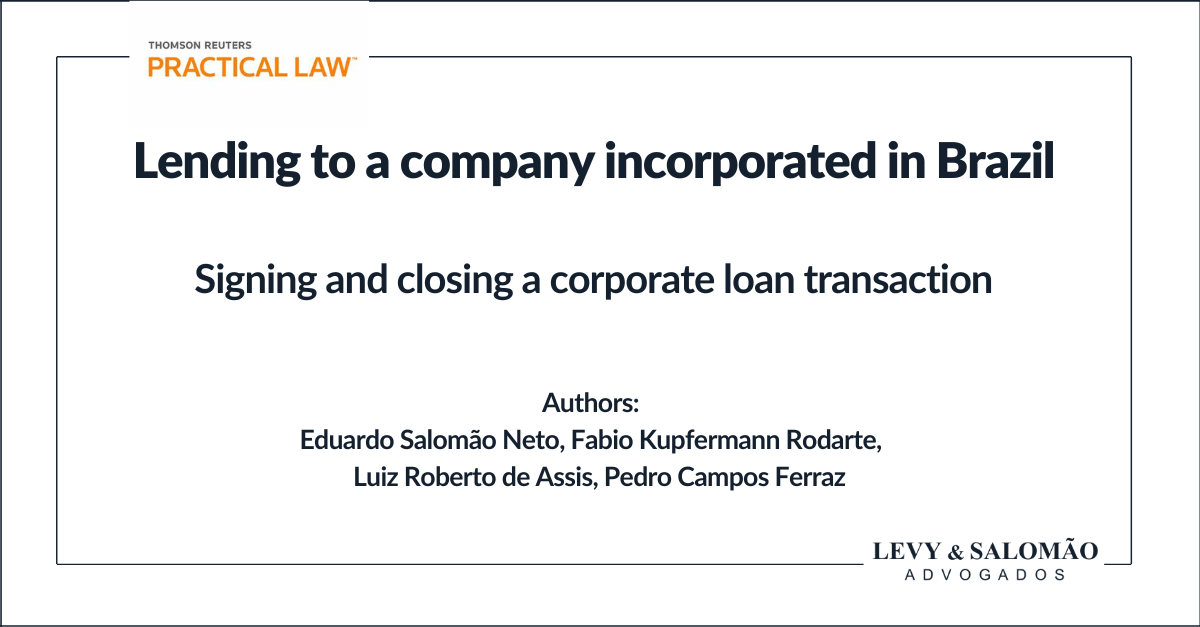Lending to a company incorporated in Brazil

This article was published on Thomson Reuters - Practical Law.
This Note is intended to be used to facilitate the signing and closing of a loan financing where a borrower, guarantor, or security provider (an obligor) is incorporated in Brazil. While the issues to be considered in relation to an obligor when signing and closing a loan agreement, guarantee, or security document will be broadly similar regardless of an obligor's jurisdiction of incorporation, there will typically be jurisdiction-specific issues that will need to be considered.
It is important to identify any signing and closing issues, specific practices, or concerns early in a loan finance transaction which involves an obligor incorporated in a jurisdiction other than the governing law of the loan financing documentation. This will then make it easier to ensure that these issues, practices, and concerns do not have a negative impact on the transaction timeline or lead to unnecessary transaction costs. Transaction-specific advice from lawyers in the appropriate jurisdiction should be taken in due course to ensure a transaction closes without any unforeseen issues.
This Note looks at the key signing and closing practicalities for a corporate loan made under a loan agreement, which is subject to English law or the law of a US state, to an obligor incorporated in Brazil. It covers the following:
• Signing Practicalities.
• Signing Formalities.
• Conditions Precedent.
• Searches at Public Registries.
• Fees.
• Filing and Registration Requirements.
This Note assumes the following:
• The obligor is a company incorporated in Brazil.
• The loan agreement is subject to English law or the law of a US state.
Signing Practicalities
In-Person Signing
It is not a legal requirement for the parties or their lawyers to attend a physical meeting at which a loan agreement, guarantee, or security documents are signed and exchanged between the parties, and virtual signings are customary. As a general rule, documents can be signed by the parties in advance of any in person or virtual meeting that is required. However, this does not apply to the execution of mortgages over real estate, vessels, and aircraft as these must be documented as a public deed which requires the parties to attend a physical or virtual meeting with a public notary.
Virtual Signings
Loan agreements, guarantees, and security documents, including security over real estate, can be signed by virtual execution methods including electronic signing platforms. However, in some states or municipalities it is not possible to create a public deed in an electronic format and sign these electronically due to operational restrictions. In that case, parties are required to attend a physical meeting with the public notary to sign the public deed.
To facilitate registration in Brazil and implement a comprehensive Electronic System of Public Registries (SERP), since 31 January 2023, public registry offices are not permitted to refuse to register loan agreements, guarantees, and security documents executed electronically provided that these documents are executed in compliance with the conditions established by the National Justice Council (Conselho Nacional de Justiça).
Counterparts
Loan agreements, guarantees, and certain security documents can be signed in counterpart and the relevant counterparts exchanged. However, this does not apply to the execution of documents that must take the form of a public deed (for example, mortgages over real estate, vessels, and aircraft), because a public deed requires the signature of the parties and a public notary on the same copy of the agreement.
Practical Arrangements for the Delivery of the Finance Documentation
All the pages of each counterpart are usually initialed by the parties although this is not a legal requirement. Initialing each page of a counterpart is done to avoid potential queries from a registrar officer who may want to confirm that the document being registered was indeed signed by all parties. This is easier to prove when the pages are initialed by the parties to the relevant agreement. Initialing each page also prevents future allegations that the document has been amended without the consent of a party.
Searches at Public Registries
Corporate Authority
Lenders normally examine copies registered with the commercial registry in the state where an obligor's headquarters are located of the following documents:
• Minutes of the borrower's or guarantor's meeting that appointed the board of officers (Diretoria).
• Minutes of the meeting that appointed the borrower or guarantor's board of directors (Conselho de Administração) (if the borrower or guarantor have a board of directors).
• The by-laws (estatuto social or contrato social) of the borrower or guarantor.
• Any powers of attorney appointing authorized signatories for an obligor.
Based on these documents, the lender can verify whether other corporate approvals are necessary for an obligor to execute the loan financing documentation.
General Searches
The public registers normally checked by a lender in the context of a secured loan financing transaction are as follows:
• Federal and state courts regarding civil, tax, bankruptcy, and criminal legal proceedings.
• Notaries or public registries that have jurisdiction over the city where an obligor has its headquarters, branches, or offices, charged with issuing notices or demands for payment at the request of creditors.
• Employment courts regarding employment proceedings against an obligor or its group company.
• Municipal, state, or Federal Union tax collection authorities.
• Environmental agencies.
• The Brazilian Ministry of Economy, for evidence that an obligor is a taxpayer.
• The real estate register.
It is possible to access an obligor's corporate documentation (including the estatuto social or contrato social) at any time through the Commercial Registry of the State of São Paulo, although these are not certified search results.
Payment of fees, which vary according to the registry, may need to be made to the relevant authorities before certificates relating to the searches in respect of an obligor can be issued.
The certificates issued by a registry reflect the information available at the date of issue, but the borrower could incur further debt or grant security subsequently. A lender is therefore not protected against future debts or liens that may be registered in the interim period between carrying out searches and registering its own secured interests.
Signing Formalities
Loan agreements, guarantees, or security documents with a Brazilian obligor as a party and governed by English law or the law of a US state do not require specific signing formalities to be enforceable in Brazil, and a loan agreement, guarantee, or security document is binding if each party signs an identical counterpart.
There are, however, specific signing requirements for mortgages over real estate properties located in Brazil and documents executed outside Brazil that may have to serve as evidence in local courts or are to be enforced directly before the Brazilian courts.
Deeds
Mortgages over real estate located in Brazil must be documented as public deeds, which require special execution procedures.
Public deeds must be drafted in Portuguese by a public notary and must contain the following information:
• The date and place of signing.
• Certification of the identity and capacity of the parties.
• The name, nationality, matrimonial status, profession, permanent domicile, and current residence of the parties.
• A clear declaration of the will of the parties to enter into the public deed.
• Certification of compliance with the legal and tax requirements applicable to the public deed.
• A declaration that the document was read in the presence of or by the parties to the public deed.
Under Hand or by Hand
There are no particular signing requirements for a loan agreement, guarantees, fiduciary ownership security, fiduciary assignment security, and pledges of movable property and these documents may be signed by hand.
Mortgages over real estate must be made by a public deed which may also be signed by hand.
Electronic Signature
Loan agreements, fiduciary ownership security, fiduciary assignment security, pledges of movable property, and guarantees may be signed electronically. Mortgages over real estate that are executed as a public deed may also be signed electronically.
It is advisable to collect the parties’ signatures through a system that applies the Brazilian certificate called the ICP key. Signatures collected through a system applying this key are presumed authentic under Brazilian law.
Corporate Seals
Corporate or company seals are not required under Brazilian law.
Notarization
An agreement signed outside Brazil must be notarized by a public notary licensed under the law of the place of signing.
It is advisable that all signatures, authentication by a Brazilian consular official or apostilles as applicable (see Apostille), are applied to the same counterpart to avoid potential issues with the Brazilian register offices.
Brazilian law requires that an agreement be executed by all parties in the country of the law chosen to govern the agreement or, in case of counterparts being signed in different countries, the last signature should be made in the country of the designated governing law of the relevant document for the choice of law clause to be enforceable in Brazil.
As a rule, a Brazilian notary must notarize the following documents:
• Mortgages over real estate located in Brazil which must be in the form of a public deed drafted by a notary.
• Fiduciary ownership rights over real estate (security in which ownership is transferred to the creditor) and pledges over assets such as agricultural and industrial assets. These documents are not required to be in the form of a public deed, however, as a rule, the signature of a Brazilian obligor must be notarized.
Additionally, it is common practice for parties to a loan financing transaction to require that the grantor's signature in a power of attorney be certified by a notary, although this is not a condition for its validity.
Certification by a notary of a signature to a document that is not in the form of a public deed can only be obtained by the presentation of the signed document at the notary's office by the signatory or a third party. Creation of public deeds, on the other hand, does not require the parties to attend the notary's office.The notary can attend a physical or virtual signing meeting and have the public deed signed electronically, although the creation of a public deed or signing electronically may not be feasible in some states or municipalities due to operational restrictions.
The notary's fees must comply with the limits imposed by Brazilian federal and state laws. The fees are approximately USD2.50 for acknowledgement of each signature and must not exceed the equivalent of approximately USD11,700 per real property mortgaged for drafting a public deed in the State of São Paulo, where most Brazilian cross-border loan finance transactions are signed and where the relevant documents must be registered. The precise amounts are set in Brazilian reais and updated annually. Different fees may apply in other federal states.
Apostille
An agreement signed outside Brazil must be notarized by a public notary licensed under the law of the place of signing (see Notarization) and the public notary's signature must be authenticated by a consular official of Brazil in the jurisdiction of signing or, if the signature occurred in a country that is a signatory to the Hague Convention on the Abolition of Requirement of Legalisation for Foreign Public Documents dated 5 October 1961, the signature must be apostilled.
Translations
A loan agreement, guarantee, or security document must be translated into Portuguese (if drafted in a language other than Portuguese) by a translator approved in a public tender and certified by the commercial registry. A translation must be registered at the Registry of Deeds and Documents where the obligor has its registered office for it to be enforceable against third parties and to be admitted as evidence before the Brazilian courts. The translated version does not require signature by the parties to it.
Conditions Precedent
Loan agreements involving a Brazilian obligor typically contain the following drawdown conditions precedent:
• Provision of information by a Brazilian borrower of loans made to it from a non-Brazilian lender, if required by the Central Bank of Brazil regulation.
• Loan agreement, guarantee, and security documents duly notarized and authenticated by a consular official of Brazil or apostilled, translated into Portuguese if required.
• Evidence of filing of guarantees and security agreements as applicable with public registries.
Filing and Registration Requirements
The most common forms of security governed by Brazilian law are pledges, mortgages, fiduciary ownership, and personal guarantees.
Guarantees and the following types of security do not need to be registered in Brazil if they are governed by foreign law and are not expected to be enforced in Brazil, regardless of where a guarantor or security provider is incorporated:
• Mortgages and fiduciary ownership over assets located outside Brazil.
• Pledge agreements over assets in the possession of persons domiciled outside Brazil.
Non-Brazilian law governed loan agreements, guarantees, and security documents must be registered with a Registry of Deeds and Documents in Brazil if they are to be enforceable in Brazil or used in evidence before Brazilian courts. Registration costs range from the equivalent of approximately USD24 to USD4,600 depending on the amount of the loan and the state or municipality where the registration is made.
Guarantees governed by Brazilian law and the following types of security must be registered before the competent registry offices in Brazil:
• Mortgages over real property located in Brazil.
• Fiduciary ownership over assets located in Brazil.
• Pledge agreements over assets in the possession of Brazilian residents.
Mortgages
Mortgages over real estate located in Brazil are perfected by registration at the Real Estate Registry Office of the place where the real estate is located.
Fiduciary Ownership over Real Estate
Security is perfected by registration before the Real Estate Registry Office of the place where the transferred properties are located.
Fiduciary Ownership over Movable Property
Case law has established that this type of fiduciary ownership is regulated under two different legal regimes:
• The Civil Code (Código Civil) (Law No. 10.406/2002), applicable when the fiduciary creditor is an individual or a legal entity, whether resident in Brazil or abroad.
• Law No. 4,728/65, applicable only when the fiduciary creditor is an institution locally licensed to operate in the Brazilian financial or securities market.
(Credit Contestation - Classification of credits in the action No. 0015946-47.2016.8.26.0100, judged on 7 February 2017.)
The Civil Code requires the fiduciary ownership over movable property agreement to be registered before the Registry of Deeds and Documents with jurisdiction over the main office, typically where the board of officers are based, or domicile of the obligor. In the case of fiduciary ownership over vehicles, registration is required with the traffic authority where the vehicle is registered. Fiduciary ownership governed by Law No. 4,728/65 does not depend on registration for its creation according to Superior
Court of Justice decision in the appeal No. 1.444.873, dated 10 May 2018. However, the registration of any fiduciary ownership established by Law No. 4,728/65 at the Registry of Deeds and Documents is advisable to eliminate any risk arising from court decisions that reach a different conclusion to ensure the enforceability of the security interest created.
Pledges
Pledges create a security interest over movable property, such as bank accounts, quotas (portions of capital of a private limited company (sociedade de responsabilidade limitada), receivables, or equipment. As a general rule, pledge agreements must be registered before the relevantRegistry of Deeds and Documents of all parties that are resident in Brazil. From January 2024, pledge agreements must be registered at the Registry of Deeds and Documents of:
• The domicile of the parties, where this is the same location for all parties.
• The domicile of one of the obligors, if the parties are domiciled in different locations.
Pledges over agricultural machinery, harvest, and industrial machinery must be registered before the Real Estate Registry Office of the place where the pledged assets are located.
Fees Relating to Fiduciary Ownership, Pledges, and Guarantees
The registration fees for these types of security are calculated based on the value of the secured assets or underlying loans and can be substantial. Maximum fees in the State of São Paulo are equivalent in reais to the following approximate amounts:
• USD 4,600 for the registration of guarantees, fiduciary ownership, or pledges in the competent Register of Deeds and Documents.
• USD 34,600 for the registration of pledges or fiduciary ownership before the competent Real Estate Registry Office.
• USD 41,200 per real property mortgaged for the registration of a mortgage before the Real Estate Registry Office.
Fees are doubled when registration must be undertaken in the domiciles of both the obligor and the secured party.






































